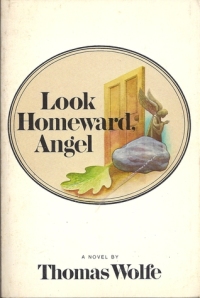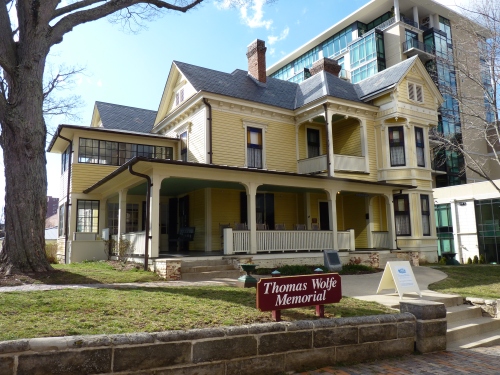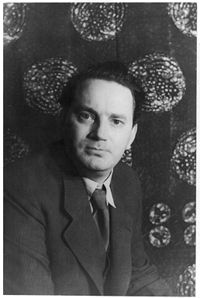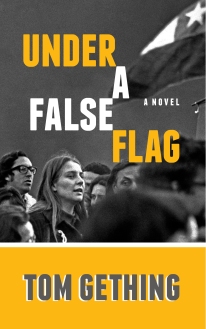My wife and I just returned from North Carolina, where we toured the Thomas Wolfe House in Asheville. The museum occupies the sprawling, many-gabled boarding house his mother once ran for visitors (many of them tuberculosis patients) seeking the cool mountain air. Wolfe memorialized the house as “Dixieland” in his deeply autobiographical first novel Look Homeward, Angel.
Our guide said that fewer and fewer people coming for the tour have read Thomas Wolfe. This surprised and saddened me. When I read Look Homeward, Angel in my late teens, I marveled at the effusive Whitmanesque language—more poetry than prose—that energized every page. Certain scenes, in particular his brother’s death, are so vivid and sad, they can still bring tears to my eyes.
Wolfe begins Look Homeward, Angel with a prose poem that echoes again and again in the 500-page book:
…a stone, a leaf, an unfound door; of a stone, a leaf, a door. And of all the forgotten faces.
Naked and alone we came into exile. In her dark womb we did not know our mother’s face; from the prison of her flesh have we come into the unspeakable and incommunicable prison of this earth.
Which of us has known his brother? Which of us has looked into his father’s heart? Which of us has not remained forever prison-pent? Which of us is not forever a stranger and alone?
O waste of loss, in the hot mazes, lost, among the bright stars on this most weary unbright cinder, lost! Remembering speechlessly we seek the great forgotten language, the lost lane-end into heaven, a stone, a leaf, an unfound door. Where? When?
O lost, and by the wind grieved, ghost, come back again.
 In rhapsodic prose Thomas Wolfe captured the voracious youthful yearning of coming of age in an isolated Southern town at the turn of the 20th Century, the tug and tussle of a large fractious family struggling to make ends meet, the lonesome whistle of a late-night train heading into the vast world beyond the encircling hills, the smell of coffee and the taste of pancakes in a diner amid the drowsy conversation of tired newspapermen as the morning edition arrives with the first rays of the sun. The love and hunger of it all, etched upon the memory, unforgettable and lost.
In rhapsodic prose Thomas Wolfe captured the voracious youthful yearning of coming of age in an isolated Southern town at the turn of the 20th Century, the tug and tussle of a large fractious family struggling to make ends meet, the lonesome whistle of a late-night train heading into the vast world beyond the encircling hills, the smell of coffee and the taste of pancakes in a diner amid the drowsy conversation of tired newspapermen as the morning edition arrives with the first rays of the sun. The love and hunger of it all, etched upon the memory, unforgettable and lost.
Wolfe has been compared to Marcel Proust in his struggle to capture the detailed essence of his life. He loved the vast all-encompassing embrace of Walt Whitman’s poetry, but he equally admired the innovations of James Joyce’s Ulysses, which manage to compress a world into a day. Wolfe’s own uniquely American style, so profuse and personal, would influence Jack Kerouac, Ray Bradbury and Pat Conroy. Faulkner said he might have proven to be the best writer of his generation had he lived.
The story of Wolfe’s discovery by Scribners editor Maxwell Perkins is one of legend. Perkins, who had discovered F. Scott Fitzgerald and launched the career of Ernest Hemingway, became a surrogate father to Wolfe. The towering six-foot-six North Carolinian, who sometimes wrote standing up using the top of his refrigerator as his desktop, arrived in New York and famously delivered an 1100-page loose-leaf first draft to Scribners. Over 330,000 words! With Perkins’ editing, it became Look Homeward, Angel, a book as sprawling as the boarding house Wolfe grew up in.
Because of the novel’s autobiographical nature (it included some 200 characters drawn from family, friends and Ashville citizens, and not all favorably), Wolfe dared not return to Asheville for eight years after its publication. He traveled to Europe and wrote Of Time and the River, an even bigger novel that continued where Look Homeward, Angel left off. It became a bestseller, although it is a less powerful story than Angel.
Critics began to say it was Perkins, not Wolfe, who was the genius behind the books (reminiscent of what people would say sixty years later about Raymond Carver and his editor, Gordon Lish). To prove himself, Wolfe broke with Scribners and went to Harper Brothers, where he basically wrote the same books over again in You Can’t Go Home Again, The Web and the Rock and The Hills Beyond, all published after his death in 1938, just shy of his 38th birthday. (According to our guide, Wolfe was on a ferry from Seattle going to British Columbia when he shared a flask of whiskey with another passenger. Wolfe subsequently contracted influenza, then pneumonia, which in turn exacerbated miliary tuberculosis probably acquired as a boy in his mother’s boarding house. Neurosurgury sent him into a coma from which he never recovered.)
Any and all of Wolfe’s novels are worth reading if only for those sections where his prose soars. But for those without the stamina for the novels, some of his finest writing can be found in his book of stories, From Death to Morning, which includes the superlative and experimental novella, The Web of Earth, about the birth of his twin brothers.
My sadness to hear that Wolfe is read less today was lightened by our excellent guide. He left us with some hopeful news and the prediction that Wolfe’s books would reach a new generation. A movie based on the prize-winning biography Max Perkins: Editor of Genius by A. Scott Berg, about the stormy relationship between Perkins and Wolfe, is being filmed and scheduled for release in 2015. Titled Genius, it stars Colin Firth as Perkins and Jude Law as Wolfe. Perhaps a ghost, a great one, can come back again.







Thanks for such wonderful writing on such a wonderful artist. So much gone and so much dusting over it. Your hand has swept clean something waiting and worthy.
Thank you, my friend. “Waiting and worthy”–what a wonderful way of describing Thomas Wolfe.
Great review dear Tom. I enjoyed learning through your post and I didn’t know that Wolfe had been compared to Proust nor that his editor had also discovered Hemingway and Fitzgerald.
Thanks for sharing your love for Literature. Really nice to came across this post today…
Best wishes, Aquileana 🙂
Thank you, Aquileana. Have a great week ahead! Cheers, Tom
I’m sorry to say I’m one of those who never read Wolfe, but your excerpt has captured my interest completely and I will go hunting with my Kindle for From Death To Morning asap. My greetings to you and your wife from Egypt, and my thanks to Aquileana’s latest post for enabling me to find and follow your wonderful blog.
Thanks for your kind words. If you can’t find From Death to Morning, which may now be out of print, look for his collected shorter works, which I think Scribners still provides. Thanks also for following my blog. Best wishes, Tom
I wasn’t familiar with the story of his death; what an unfortunate gulp of whiskey – to say the least… I read his work years ago and I think it may be time for a revisit.
Hi Letizia, I suspect with the tuberculosis he might have become ill anyway, and at least he got to enjoy the whiskey! I hesitate to reread him, only because his books’ influence on me was so strong. I fear he was the right person to read at a young age, and now I might be disappointed. It’s a funny thing about some authors, there’s a right time and place (right frame of mind?) that makes all the difference. Thanks for your comment and have a great week!
Thank you for this beautifully written homage to Thomas Wolfe.
My AP English syllabus in the 10th grade listed “Look Homeward Angel.” But I foolishly thought it was Tom Wolfe, whose book “Electric Kool Aide Acid Test” I’d read & did not like.
Fast forward 45 years & I saw the brilliant movie “Genius” (Jude Law, Colin Firth, Nicole Kidman, Laura Linney) and FELL IN LOVE with Thomas Wolfe.
So I went to the library & checked out “O Lost.” Then bought a copy so I could read & re-read. Bought all of his books. Biographies about him and his published, Maxwell Perkins. He is THE writer I have been looking for all of my life I grew up moving all over America (and parts of Mexico & Canada). My father was born & raised in Georgia. We lived in all the southern states, as Dad mapped & explored geological formations. We even lived near Ashville, NC but I was 8 years old & never “heard tell” of the great Thomas Wolfe. Oh, his lovely words. His ecstatic outpourings of language, scenes, peoples’ lives. I cannot extol him enough!
Thank you for your comment. It has been years since I read him and I have always been a little afraid to try again, as he made such a strong impression on first reading. Would I be let down? I wondered. Your enthusiasm for reading him inspires me to brush those fears aside and pick up “Look Homeward, Angel” again.
Very interesting blog post. Having researched Perkins and his writers back in the 1980s for my MBA, I finally got to visit Asheville just this last summer. The house is a wonderful tribute to him, and such a fascinating lesson in how families lived in that time. I’m going through my research now again in preparation for a five-week class I’m doing on Perkins for the University of Pittsburgh Lifelong Learning program, and we are going to watch the film Genius, which I really enjoyed…
Thanks, Kathleen. I appreciate your comment. I was fascinated by Perkins when I was in college. Perhaps you have read the correspondence between Fitzgerald and Perkins in “Dear Scott, Dear Max”? If not, it’s well worth the read as the their relationship was also very special. But what I really want to know is how you got to study Perkins for an MBA when there I was studying international finance for mine! Or was that an MFA?
Definitely an MBA, here at Duquesne University. I was interested in the concept of managing creative people, so I did a case study of Perkins, whom I’d heard of, and Berg’s book had just come out. Here’s the less academic version of my thesis: https://suchfriends.wordpress.com/manager-as-muse-a-case-study-of-maxwell-perkins-work-with-f-scott-fitzgerald-ernest-hemingway-and-thomas-wolfe/
That was a very creative approach to take. I wish I had been so clever. Thanks for the link.
#shamelessselfpromotion
Nice story. I concur!